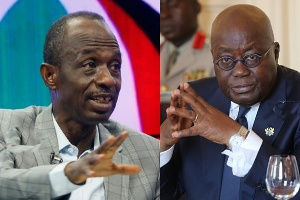National Chairman of the opposition National Democratic Congress (NDC), Johnson Asiedu Nketiah has described the government of President Nana Addo Dankwa Akufo-Addo as worst than some military regimes in the history of Ghana.
According to Aseidu Nketiah, he has arrived at the conclusion that President Akufo-Addo has fooled Ghanaians.
“From 1992 onwards, we were on course making improvements over the previous year every new year. But Nana Addo’s term has sent us back in terms of our politics and governance and I feel pained by that.
“The reason why I am pained is that I’ve had some crisscrossing with Nana Addo… when we rose to fight against the military governments of Acheampong and Akuffo, we were very active in those days as students.
“As students we were very active in the People’s Movement for Freedom and Justice led by the likes Nana Akufo-Addo. So at that time we saw Akufo-Addo as a hero who was going to exhibit democracy if God gave him an opportunity to become president,” he told Captain Smart when he appeared on Onua TV’s morning show.
Despite his earlier conviction about Nana Addo, Asiedu Nketiah said he has proven himself to be worst in government.
“So down the line that he finally became president, even though we are not in the same party we all thought he will at least not cross some lines. But it has come to a point where looking at his performance in government he has performed worse than the Acheampong and Akuffo regimes that we were fighting against in terms of governance.
“So I am pained because he has fooled us… It makes me think we were all just being foolish by following him because it has turned out that the true democracy he was leading us to fight for was just him seeking for an opportunity to enrich himself and his family. It means he has fooled us and when I sleep and think about it, I feel pained,” he said.
Asiedu Nketiah said Akufo-Addo’s administration has been characterised by undermining Ghana’s democracy through subversion of key state institutions including the media, judiciary and traditional leaders as well as electoral processes.
Source: ghanaweb.com




